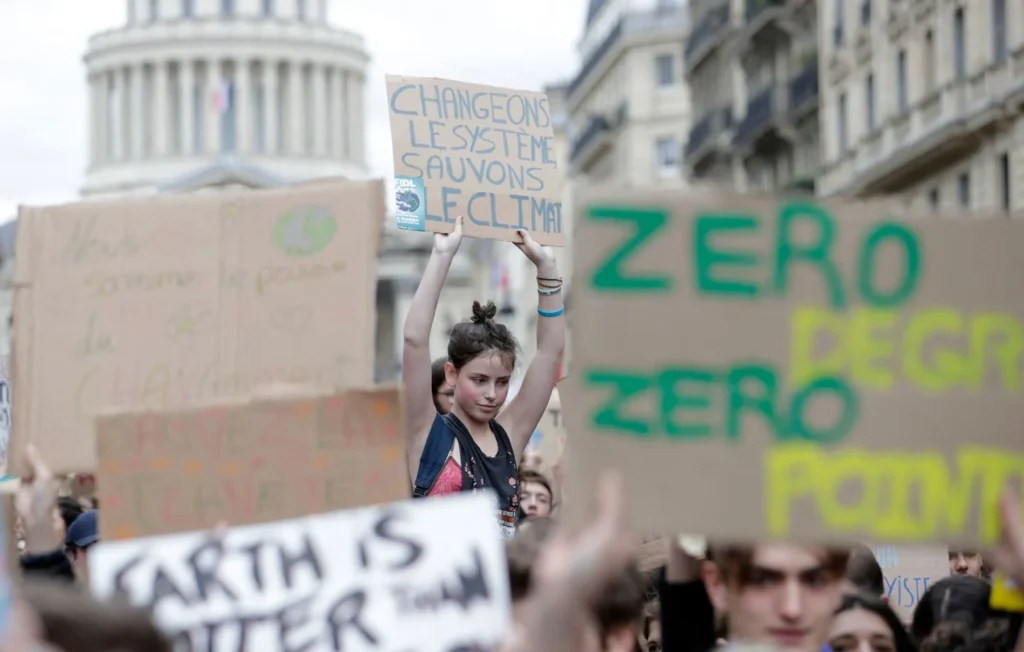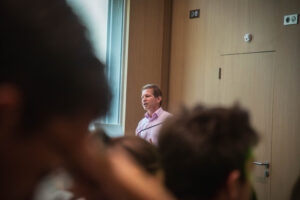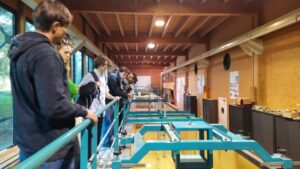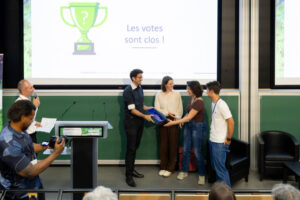Understanding the process of raising awareness and mobilizing a generation: read “Young engineers facing environmental emergencies.”


While their elders often envisaged a linear career path, dedicated to technical progress and economic growth, young engineers today are faced with a complex and distressing reality: that of a world threatened by climate change, the collapse of biodiversity, and growing social inequalities. For many of them, this situation creates a dissonance between the technical skills they have been trained in and their awareness of the ecological and social impacts of this technological progress. In recent years, against a backdrop of warnings from the IPCC, young graduates have become increasingly vocal, and movements such as Pour un Réveil Écologique (For an Ecological Awakening) and Extinction Rebellion have been created.
To better understand this internal tension and its effects on the trajectories of young engineers, Cécile Schwartz chose Mines Paris – PSL as her field of study. A prestigious engineering school closely linked to industrial development and mineral resource extraction since its creation in 1783, the school is emblematic of the last two centuries, even though it has been quick to embrace the issues of ecological transition, both in its research activities and in its teaching.
Structured in three successive phases, the ARM transformation process described in detail by Cécile Schwartz is an emotional and intellectual journey, but also an individual and collective one, leading young engineers from individual awareness of the gravity of the situation to institutional and societal mobilization. Organized according to the three phases of the process, the numerous verbatim accounts collected allow us to closely follow the inner journey of these young engineers.
Awareness of the seriousness of the climate situation and its “terrifying prospects,” in the words of Bruno Latour, is accompanied by a profound personal upheaval. During the first phase of the process—Absorbing—which is individual and personal, students successively:
It’s a shock because these are concepts we’ve never heard of before. And that shatters the idea we had of our lives. It calls into question many of the things we have experienced. It’s a kind of sudden eye-opening, the feeling of having been walking down the wrong path for twenty years.
Recent graduate P17
 Course on “Energy and Climate Change” by Jean-Marc Jancovici.
Course on “Energy and Climate Change” by Jean-Marc Jancovici.
These emotions, far from being trivial and marginal, are shared by the majority of the School’s students and recent graduates. An online survey conducted in 2022 among the P11 to P22 classes shows that among the 400 respondents:
Once you start asking yourself questions, or asking questions and getting answers that aren’t sugarcoated, the carefree attitude disappears. Most of my friends feel the same way. I don’t know anyone in our generation who says they are completely carefree about what is happening around us, unless they are lying. I know people who say they are carefree, but I find that hard to believe. P21 student
To move forward in this first phase, Mines Paris – PSL students benefit from an academic environment that promotes this awareness:

Visit to the ACRI-IN wave basin, a design office in Sophia Antipolis specializing in coastal development, maritime engineering, and maritime and port project management, as part of the MIG ALEF, development of renewable energies in a port terminal.
To remain consistent with this sometimes dizzying realization, young engineers will change their behavior in their family and social circles.
The break [with my parents] began with vegetarianism. It was inconceivable for my parents to make meals without meat, especially holiday meals. What’s more, when I went home, I had to be careful not to upset them too much. Recent graduate P18
Once their convictions have been forged and affirmed, and the first behavioral changes have taken hold, young engineers continue the ARM process with commitments in the institutional sphere. They can then get involved in the academic framework of the School, challenging it on some of its partnerships and requesting new courses. Many of them begin to think about how to adapt their career paths to minimize their environmental impact (by avoiding polluting companies, rejecting greenwashing, choosing sectors with a low impact, etc.). More broadly, a number of them will rethink the role of the engineer as a “bridge” between disciplines and develop a global vision of these subjects (by adopting a systemic approach, integrating material, technical, economic, and social constraints, or taking into account interdependencies, etc.).
Engineering is not done in a vacuum; there is inevitably a political agenda and social and environmental impacts. There is nothing less neutral than being an engineer.Recent graduate, P18
This mobilization takes various forms, for example:
For some, the transition is seen as a vast undertaking, both systemic and collective, combining technological innovations and the transformation of production methods. The professional projects of these young engineers may focus on energy efficiency, material recycling, infrastructure adaptation, or the resilience of industrial and territorial systems, while taking into account the material constraints of companies.
Cécile Schwartz’s study also highlights the importance of the role played by the collective. At Mines Paris – PSL, the small size of the classes (around 150 students per year), the homogeneity of sociological profiles, and the fact that students follow the curriculum at the same pace are all factors that encourage the sharing of emotions, thoughts, and beliefs, which helps to avoid silos and the risk of stigmatization within the classes and facilitates collective support.
I think it was essential to not feel alone, to just feel understood, because that wasn’t necessarily the case elsewhere. It changed my group of friends a lot. Recent graduate, P17
The strength of the collective at Mines was very important. We all asked ourselves these questions at the same time and we all encouraged each other to make changes. It was essential for not feeling alone, for just feeling understood. Recent graduate P17
This collective support enables young engineers to resist denial, to accept giving up a certain level of comfort, or even the risk of being marginalized. It allows them to gain confidence in their convictions and to position themselves outside the traditional paths expected of young graduates of the School.
In addition to this collective dynamic and the integration of these issues into the IC cycle in 2018, the close relationship between students and management facilitates the progress of the process. This closeness allows the School to listen to its students’ concerns. This listening has led, for example, to the creation in 2020 of the “Engineers and Transition” seminar, designed and led by the students themselves, and to the decision to no longer travel by plane for training purposes. In general, this listening allows students to experience first-hand the initial challenges of serving the ecological cause and the results of these challenges within an institution.
At Mines, we are fortunate to be able to change with the system. (…) It is a real example of change that can be achieved, in quotation marks, from within. It is a change that comes from the students’ initiative. But make no mistake, it is the students who are driving this change. But it’s happening so quickly and the academic administration is so responsive and attentive that it doesn’t feel like there’s any conflict. Recent graduate P17
This dynamic of transformation is also supported by the commitment of the teaching and research teams, who choose to integrate environmental issues into their courses:
Much of the transformation in teaching comes from the fact that some teachers are aware of the issues and have a good understanding of them. They naturally integrate these topics into their teaching, to a greater or lesser extent. Damien Goetz, teacher-researcher at the Center for Geosciences
Cécile Schwartz’s study highlights a shift in the way young engineers think and act: without completely rejecting technology, they are placing it in a broader context where ethics, living organisms, and planetary boundaries become structuring reference points. They no longer want to have to choose between aligning themselves with their convictions and their professional careers, but instead seek to reconcile the two. At the same time, the multidisciplinary nature of their education, which is both theoretical and practical and combines hard sciences and humanities, enables them to take into account material realities and industrial constraints in economic challenges and societal issues.

Presentation of the TTI.5 Environmental Controversy Award, recognizing the best analysis by engineering students on the theme “Inspiration from Nature: What Prospects for Transition? ,” by Matthieu Mazière, Director of Studies in charge of the Civil Engineering (IC) program, at the Forum de The Transition Institute 1.5 (TTI.5), held on June 3, 2025, on the Paris campus of Mines Paris – PSL.
For Cécile Schwartz, these young engineers now view their role through a new paradigm:
I strive to ensure that they are aware of these problems and the difficulties in finding solutions, that they are capable of deep reflection, that they understand the importance of history, and that they take into account the human beings, the men and women behind these issues. I would like them to leave the School without being naive about the situation, taking societal aspects into account. Matthieu Mazière, Director of Studies in charge of the Civil Engineering program (IC)
This paints a picture of an engineer who is no longer content with simply optimizing, but wants to be aware of the political, ecological, and human implications of their professional actions and contribute to building a sustainable future.
Book published by Presses des Mines by Cécile SCHWARTZ, “Young engineers facing environmental emergencies. The experience of the École des Mines: a 3-phase process”

Since 2003, Europe has made significant progress in adapting to heat waves: proportionally, fewer people are dying, even though temperatures are highe...